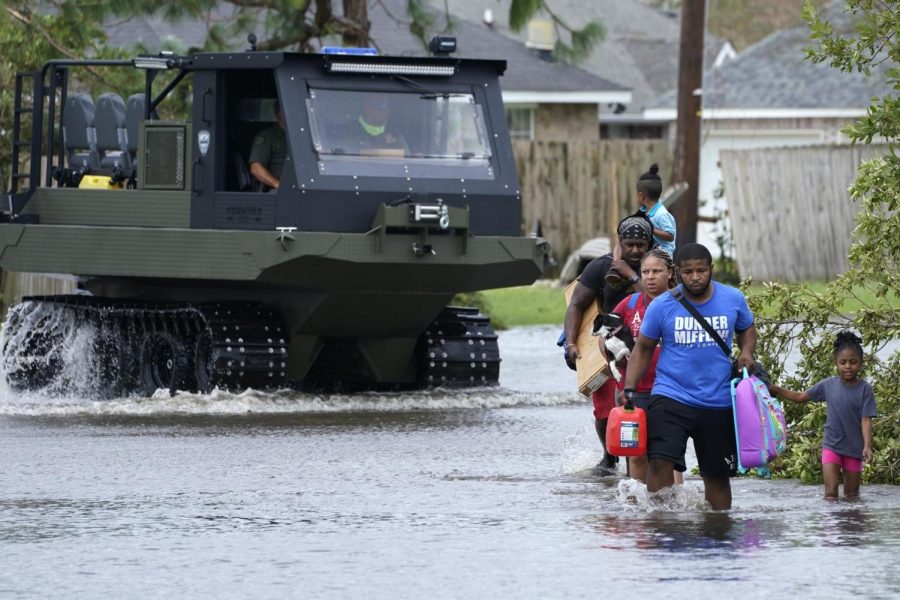Hurricane Ida makes landfall, relief begins
Eight states between Louisiana and New Jersey impacted
September 13, 2021
Exactly 16 years after Hurricane Katrina hit Louisiana, Hurricane Ida did the same. Ida was a category 4 storm with maximum sustained wind gusts of 150 mph.
The storm came ashore in Port Fourchon around noon on Aug. 29 and has now caused chaos all the way from New Orleans up to New Jersey. As of last Wednesday, 26 people in Louisiana died from Hurricane Ida and its aftermath, according to the Associated Press.
As Ida travelled, it flooded homes and businesses and destroyed cities in eight states.
Relief for those who were most affected by Ida began almost immediately in Louisiana.
In a statement released the day before Ida made landfall, Gov. Edwards said there were pre-positioned search and rescue teams and boats ready to start helping people as soon as it was safe to do so.
“Hurricane Ida is one of the strongest storms to ever hit Louisiana,” Gov. Edwards said in a statement. “It is our goal to assist our local agencies and the citizens of the state as quickly as possible.”
All of New Orleans lost power the day Ida hit and nearly one million lost power throughout the state. As of last Friday, power has been restored to 735,000 of the 902,000 customers who lost power because of the hurricane, according to Entergy.
In Grand Isle, 100% of the buildings were damaged to some extent. Grand Isle is the last inhabited barrier island of Louisiana, with a population of 740 in 2019.
In an interview with CNN, Bryan Adams, the director of Jefferson Parish Fire Services, said 40-50% of the houses are gone and it will take four or five years to get Grand Isle back to what it was.
“A lot of people have lost their homes, talking about how they don’t know whether they’ll be able to go back or not, because they don’t have the money to go back, can’t afford to go back,” Adams said.
While relief started almost immediately in Louisiana, it took longer in northern states impacted by the hurricane because flooding was not expected to be as bad as it was.
According to the New York Times, Hurricane Ida killed at least 43 people in New York, New Jersey, Pennsylvania and Connecticut, and more than 150,000 individuals were left without power.
In Central Park in Manhattan, 3.1 inches of rain were recorded within one hour, according to NPR.
Many individuals in the north did not have time to evacuate because they had no idea the hurricane would impact them as much as it did.
However, residents in Louisiana’s coastal parishes evacuated to places all throughout the state, including Monroe. According to the News Star, about 700 evacuees from Terrebonne, Lafourche and St, John the Baptist parishes came to Monroe and were housed in the Civic Center.
As of last week there were only about 200 evacuees left in Monroe. The state moved many of them to shelters closer to their homes so they could assess the damage, according to KNOE.
On-campus housing at ULM was provided for Southeastern University students affected by the hurricane to stay in for a couple of weeks while power was restored and repairs were made to Southeastern.
ULM students, faculty and staff helped out by volunteering after the evacuees arrived. United Way donation boxes were set up on campus and faculty members volunteered to take all donations to the Civic Center.
Many nursing students went to the shelter right after the evacuees arrived and they helped distribute donations, took vitals of the people there and helped with other medical needs.
Paula Garrison’s semester 5 clinical class raised $1,400 in donations to help those at the shelter. Semester 3 nursing students in the pediatric rotation also volunteered their time to play with the children at the shelter.
Amber Vorisek, a semester 5 nursing student, said some of the students got prescriptions filled for evacuees. She said a lot of people have nothing left and the nursing students just wanted to help them however they could.
“We played the role of a nurse and honestly tried to meet any need we could to help people that lost everything,” Vorisek said.



